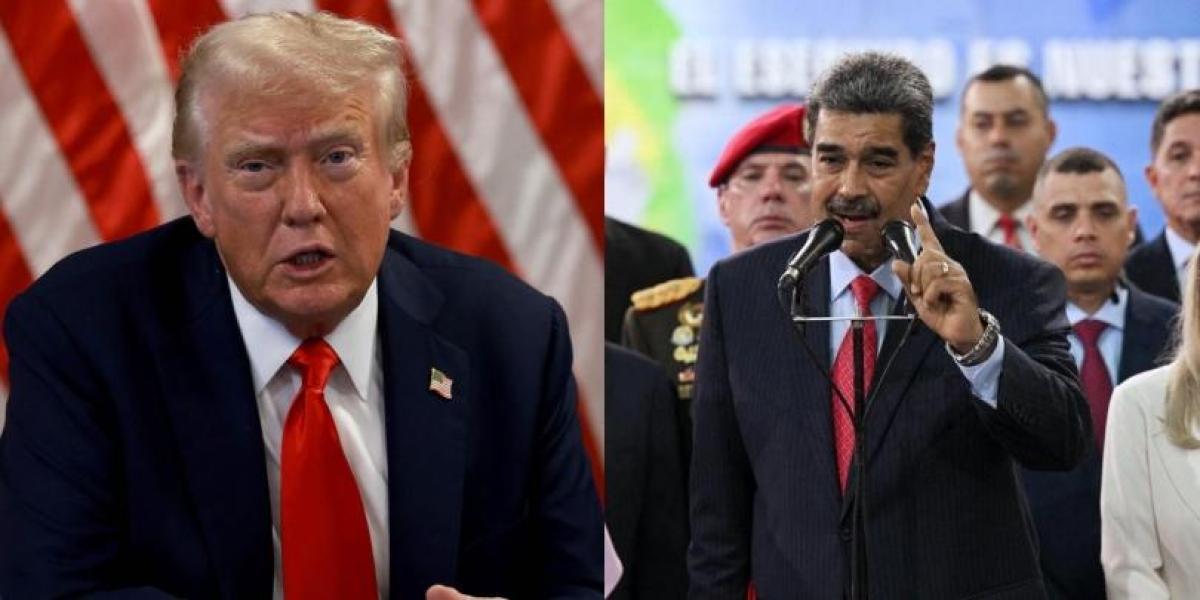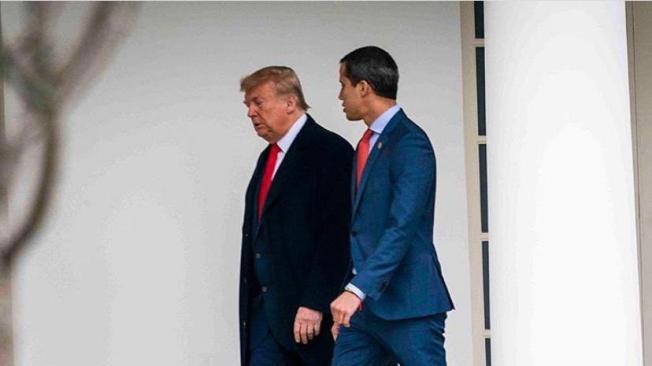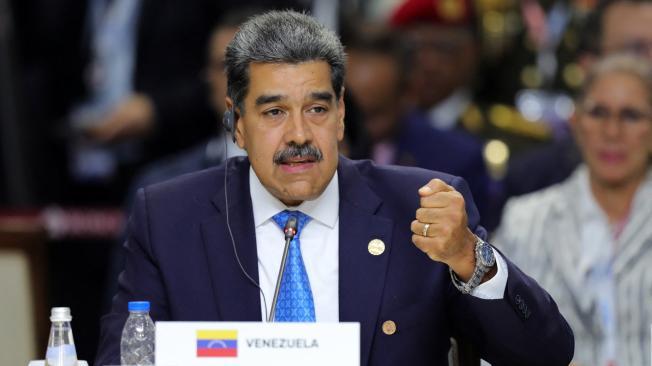How are the Maduro government and the opposition left with Trump’s victory?

Economy, migration, politics and anti-fascism are the four issues that are once again on the United States agenda with Venezuela after the return of Republican Donald Trump to the White Housea result that at first glance bothers the administration of Nicolás Maduro, but that at the moment seems cordial, at least that’s what Miraflores said in a statement.
“The Bolivarian Republic of Venezuela congratulates the people of the United States of America for the presidential elections held on November 5, 2024, and the president-elect Donald J. Trump for his victory in said process,” the letter states, adding that “Venezuela will always be willing to establish good relations with the US governments, framed in a spirit of dialogue, respect and common sense.”
But to understand the impact of the Caracas-Washington relationship and Trump’s return to power (he governed between 2017 and 2021), we must go back to 2019 when, in a strong and forceful way, the then Republican president went headlong into supporting the Venezuelan opposition. and promote the proclamation of Juan Guaidó as interim president, in an attempt to overthrow Maduro.
Certainly that decision, supported by more than 50 countries along with strong economic sanctions, suffocated the economy of the South American country and greatly weakened Maduro.
In fact, a couple of years later it was learned that on the night of January 22, 2019, the acting vice president, Mike Pence, called Guaidó directly and “gave him the order” to be sworn in the next day as interim president, as revealed by a source to THE TIME.
Date that was not a coincidence, since January 23, when the act was issued, coincided with the fall of the Venezuelan dictatorship that occurred on January 23, 1958.
Then Trump seemed more defiant than ever and Maduro couldn’t find respite. The world witnessed how the Republican received Guaidó and promised him greater support.
Trump’s own advisor, John Bolton, confessed that the United States actively participated in attempted coups against Maduro.

Juan Guaidó and Donald Trump at the White House Photo: Courtesy
But the northern country went to the polls in November 2020 and elected Democrat Joe Biden as Trump’s replacement, something that in the Venezuelan case was a substantial respite for Chavismo.
Especially because given the crisis of February 24, 2022 when Russia decided to invade Ukraine, the United States was forced to look for new allies regarding the inputs that this area of the world provided, and thus decided to relax the sanctions on the Chavista regime. , giving you significant economic relief.
In exchange for a commitment to transparently execute the electoral process at that time, the United States and Venezuela exchanged prisoners, among them the Colombian Alex Saab, accused of being Maduro’s front man, who once imprisoned in Florida was released and ended up returning. to Venezuela, where he is now Minister of Industries and National Production.
The story ended sourly. Although Chavismo held elections on July 28, the process ended by proclaiming Nicolás Maduro as the winner, despite the fact that the ruling party has not presented the minutes to prove it and while a suffocated opposition has its candidate – and recognized president-elect by several nations – Edmundo González, exiled in Spain and the voice behind him, María Corina Machado, in hiding.
Is Trump’s victory good news for the Venezuelan opposition?
Now the Venezuelan opposition seems to have hope of recovering its ally with María Corina Machado and Edmundo González at the helm.
“President Trump, the democratic government that we Venezuelans elected on July 28, and that constitutionally assumes its mandate on January 10, 2025, will be a reliable ally to work with your administration for the well-being of our people, the return of our families, hemispheric security, the political stability of the region and the real use of our energy potential,” Machado wrote this Wednesday on his X account.
Political scientist Daniel Árias, an expert in regional development, considers that Trump’s victory has “enormous” consequences for Venezuela.
From Venezuela, I extend my congratulations to President-Elect Donald J. Trump for his victory, and to the people of the United States for a civic and massive electoral process.
Venezuela is experiencing decisive days for millions of citizens, and for democracy and the stability of…
— María Corina Machado (@MariaCorinaYA) November 6, 2024
“It is a political victory for both Edmundo González and María Corina Machado, who have long been allies of the Republican Party. There is no doubt that there will be a redirection of politics towards Venezuela,” says Arias.
Also consider another key factor: the Republican majority in Congress, they have already won the Senate and are waiting to add majorities in the House of Representatives. If this happens, Senator Marco Rubio could take advantage of that majority to promote “tougher and more forceful policies towards the governments that confront the United States,” says Arias.
However, he warns that the best thing for both countries would be to cooperate, but apparently with Maduro in Miraflores that will be uphill.
What can be expected from Trump towards Maduro?
Other analysts consider that the relationship will not be the best, but there will not be an aggressive policy towards Caracas either.
Laura Dib, director for Venezuela of the Washington Office for Latin American Affairs, believes that there is uncertainty and ambiguity about the Venezuelan cause: “The statements that have been made on the issue (Venezuela) are truly very superficial,” she told THE TIME.
Certainly, Trump has not entered into those waters, the closest thing has been to reject the actions of the Venezuelan criminal gang the Tren de Aragua in the United States, which precisely as a result of migration now commits crimes in that country.
But for Arias, there will be a political response of some kind, remembering that Caracas has several Americans imprisoned.
“Trump may consider that they are political kidnappers and that can lead to the conflict escalating exponentially,” says the political scientist.
“Trump could remove Maduro’s thorn,” comments an analyst who preferred to remain anonymous due to the sensitivity of the matter. “His policy towards Maduro was a failure, Trump must reverse that so as not to look weak,” he insists.
And for Edmundo González, the opposition exiled in Spain, it is time for a good relationship.
“The American people have expressed their sovereign will, reaffirming the value of institutions, the democratic spirit and the strength of alternation that reinforces confidence in the electoral and political institutions of representative democracies. From the same responsibility as president-elect, I wish to strengthen our relations always for the benefit of our people,” he wrote in X.
Migration, economy and fascism
The immigration issue takes on special relevance on the agenda when hundreds of Venezuelans arrive illegally every day in the United States after crossing the dangerous Darien jungle and could become exacerbated after January 10, if Maduro is finally sworn in as president. .
According to the immigration authorities of Panama, Venezuelans continue to be the largest group of migrants transiting through the Darién jungle and compared to August, September had an uptick. Of the 25,111 migrants who crossed, more than 80% were Venezuelans, the rest Colombians, Ecuadorians, Chinese and dozens of other nationalities.
A situation that raises alarm bells with the Republican’s first speech as president-elect: “We have to close the border, let people enter the country legally,” Trump said this Wednesday morning upon learning of his victory.

Nicolás Maduro at the Brics summit in Kazan. Photo: Presidency of Venezuela/ AFP
What is not known is what Trump will do when deporting the thousands of Venezuelans who are clamoring to be let in. Where are you going to send them if there are no relations with Caracas and the agreement to send them through Mexico was broken? It is the question.
Added to this is the fact that Venezuela sends around 300,000 barrels a day to the United States through the license granted to Chevron. Will Trump renew those licenses? is another of the questions.
Finally, there is the issue of fascism. Left-wing anti-American groups were in Caracas this weekend to celebrate the Anti-Fascist Congress, promoting and renewing anti-imperialist ideas.
Among the agreed points are:
- The native peoples of rebellious and mestizo America are resisting and fighting neocolonial barbarism.
- The profound thought of the Bolivarian Revolution is to build an original model that unites America.
- The loss of global hegemony of imperialism and the emergence of the new pluripolar and multicentric world are signs of a new power bloc in 100 years.
- Venezuela 🇻🇪 has and will have the moral, political and spiritual strength to continue its advance on the paths against fascism.
- For Arias, these movements aim to confront the United States, “which can be very dangerous from a political and economic point of view, considering that the Trump government can respond forcefully to these threats.”
*The Grupo de Diarios América (GDA), to which El Nacional belongs, is a network of leading media outlets founded in 1991, which promotes democratic values, the independent press and freedom of expression in Latin America through quality journalism for our audiences.
Independent journalism needs the support of its readers to continue and ensure that the uncomfortable news they don’t want you to read remains within your reach. Today, with your support, we will continue working hard for censorship-free journalism!
